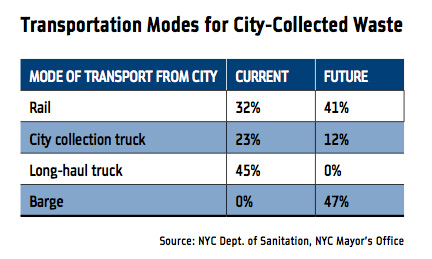Streetsblog has been gathering responses to yesterday's release of PlaNYC 2.0. This is the second installment. Read the first part here.
Joan Byron, director of policy at the Pratt Center for Community Development, told us the update to the city's sustainability plan includes some promising developments on the truck traffic front. She noted that some of the biggest differences between the revised PlaNYC and the original have to do with freight transportation:
PlaNYC 2.0 includes a lot more specifics about freight than 1.0 did. The big projects it references -- the Port Authority's Cross Harbor Rail Freight Study, rail and barge upgrades at the South Brooklyn Marine Terminal and at the 51st and 65th Street (Brooklyn) yards, and incorporation of rail improvements in the rebuild of the Hunts Point Produce Market -- are already committed or underway, but it's still significant that the plan calls them out. And it's great that the city will be gathering more data about food-related freight movement, because the patterns of long-haul, regional, and local food movement have changed a lot in recent decades, and will continue to change, as food production continues to simultaneously globalize and to localize.
It's great that there's some space given to local truck congestion issues. I'd like to see more about pilot projects, and also a commitment to better data gathering and analysis by NYCDOT. There's shockingly little information available now about types of goods being trucked within the city, their origins and destinations, specific time and other constraints affecting different subsectors, etc. Without a better understanding of the problem, it's hard to know where the opportunities are for innovative solutions.
The Pratt Center cares about freight movement for a couple of reasons. Low-income communities and communities of color bear a disproportionate share of the impacts of both local and long-haul trucking. And truck-dependent industries -- food production, construction, service and repair (of everything from TV cable boxes to big-building mechanical equipment) are important blue-collar employers that offer some of the best remaining pathways into the middle class for New York's workforce. So there are environmental and economic justice reasons to make freight movement work better citywide.
Byron singled out the PlaNYC update's section on transporting trash as a good sign:
It's also a great relief to see explicit treatment of solid waste in this version of the plan, including a re-affirmation of the city's commitment to implementing the Solid Waste Management Plan by moving ahead with planned marine transfer stations in Manhattan. Shifting away from truck-based garbage export will enable the city as a whole to reduce carbon emissions associated with solid waste disposal. And fairly sharing the burden of managing our trash gives all of us a stake in reducing our total tonnage. The status quo, relying on truck-based transfer stations located mainly in the South Bronx and Brooklyn, has kept the problem out of mind and out of sight for the wealthiest New Yorkers whose consumption contributes the most to the problem.






